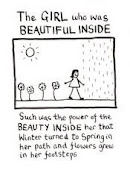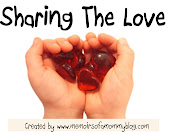Not knowing some of the sources, I debated posting the following bits but decided that the positive and empathic nature of them was worthwhile. I would gladly have linked to the magazine articles but that option wasn't available so you get as much quotes as I could conveniently type. Sorry about that.
January's issue of Spirituality & Health magazine, a freebie subscription I accepted because of subject matter, was in my mail this past week. One short blurb, under a collection called Updates & Observations, was entitled Intimate Gifts from Depression. This article stated that:
Knowing my friend Susan's feelings about the negative reputation of depression, I felt this might be worth publishing as a bright spot and hopefully a counter measure. Having experienced depression myself, it's nice to know I've grown from it. (g)
A few pages further along was another collection of bits called Connections. It had an article, under the subheading M.D. Trauma, entitled Doctor Mistakes Lead to Loss of Empathy...Which Leads to More Mistakes by Stephen Kiesling. It had a source, The Journal of the American Medical Association, so if you want to read the related study go here. This one talked about the idea that "when doctors make mistakes there are two victims; the patient, who suffers from the mistake, and the doctor, who suffers from the shame and guilt of having made the mistake." According to the article:
This really struck home. My sister is a doctor, a psychiatrist, and has expressed concern over decisions she must make in her patients' treatments. The things my sister might experience by making a major medical error are: 1) significantly lowered quality of life, 2) higher levels of burnout, and 3) nearly twice the rate of depression compared to doctors reporting no major errors. She could also lose emotional empathy and cognitive empathy, which seems significant to me although those two results were not considered statistically significant. No wonder she works so hard at managing her stress!
For years my sister has meditated, run, practiced yoga, and found time to indulge herself in order to make her life and world a happy place for her. I suspect she found it necessary during her residency simply to survive. I love my sister and would never want any of the things listed to happen to her. I wouldn't want them to happen to my doctor(s) either. As a patient, I build a relationship with my physician and want to believe that he/she cares about me personally and professionally. The personal side of knowing each other supports the trust I have in his/her decisions, which helps us both on the professional side.
I've had a doctor tell me that my trust in him helped me heal better after surgery. This was from a surgery that went wrong. It wasn't his fault that things went south. He had responded to my report of a previous experience (I react to catgut - an old style suture material) and during my surgery he used a newer, lighter suture. It snapped in the middle of an operation to reposition a muscle on an eye that was turning out. The muscle that suture was attached to retracted out of sight behind the eye and I ended up spending 6.5 hours on the table while the team fished behind the eye trying to find the muscle. This was during the late '70s when I was young, in the military, and the doctor was doing his residency. The eye recovered and so did I.
It's a safe bet, that young doctor breathed a huge sigh of relief when he finally found the muscle. If it had been me, I would have cried and buckled at the knees. Somehow I don't think young doctors get much crying time even though they almost certainly need it. So when the study urges training hospitals to make sure their residents are given the help they need to deal with the aftermath of wrong decisions, I'm in favor of it! Furthermore, I hope they move that help beyond the training stage to support all doctors whether they work at a hospital, a clinic, or in private practice. I want my doctors empathetic towards me....and I hope I can be the same in return for their good and thoughtful care. Thank you!
"Psychology researchers at the University of Texas at Austin had hypothesized that women who experienced depression in the past would be 1)more prone to it in the future, 2) more closed about their emotional life, and 3) less likely to experience intimacy than those who hadn't. The results of their research proved those hypotheses wrong. Women with depression in their past were not more prone to depression in the future and, in fact, had slightly greater levels of "self-disclosure" and "marital intimacy" than women who had never experienced depression."
Knowing my friend Susan's feelings about the negative reputation of depression, I felt this might be worth publishing as a bright spot and hopefully a counter measure. Having experienced depression myself, it's nice to know I've grown from it. (g)
A few pages further along was another collection of bits called Connections. It had an article, under the subheading M.D. Trauma, entitled Doctor Mistakes Lead to Loss of Empathy...Which Leads to More Mistakes by Stephen Kiesling. It had a source, The Journal of the American Medical Association, so if you want to read the related study go here. This one talked about the idea that "when doctors make mistakes there are two victims; the patient, who suffers from the mistake, and the doctor, who suffers from the shame and guilt of having made the mistake." According to the article:
"a study of resident physicians at the Mayo Clinic Rochester Internal Medicine Residency suggests that more work needs to be done to take care of the second victim. Why? Because doctors' mistakes can lead to depression, burnout, and loss of empathy with patients - making it more likely that the doctors will make another mistake in the future."
This really struck home. My sister is a doctor, a psychiatrist, and has expressed concern over decisions she must make in her patients' treatments. The things my sister might experience by making a major medical error are: 1) significantly lowered quality of life, 2) higher levels of burnout, and 3) nearly twice the rate of depression compared to doctors reporting no major errors. She could also lose emotional empathy and cognitive empathy, which seems significant to me although those two results were not considered statistically significant. No wonder she works so hard at managing her stress!
For years my sister has meditated, run, practiced yoga, and found time to indulge herself in order to make her life and world a happy place for her. I suspect she found it necessary during her residency simply to survive. I love my sister and would never want any of the things listed to happen to her. I wouldn't want them to happen to my doctor(s) either. As a patient, I build a relationship with my physician and want to believe that he/she cares about me personally and professionally. The personal side of knowing each other supports the trust I have in his/her decisions, which helps us both on the professional side.
I've had a doctor tell me that my trust in him helped me heal better after surgery. This was from a surgery that went wrong. It wasn't his fault that things went south. He had responded to my report of a previous experience (I react to catgut - an old style suture material) and during my surgery he used a newer, lighter suture. It snapped in the middle of an operation to reposition a muscle on an eye that was turning out. The muscle that suture was attached to retracted out of sight behind the eye and I ended up spending 6.5 hours on the table while the team fished behind the eye trying to find the muscle. This was during the late '70s when I was young, in the military, and the doctor was doing his residency. The eye recovered and so did I.
It's a safe bet, that young doctor breathed a huge sigh of relief when he finally found the muscle. If it had been me, I would have cried and buckled at the knees. Somehow I don't think young doctors get much crying time even though they almost certainly need it. So when the study urges training hospitals to make sure their residents are given the help they need to deal with the aftermath of wrong decisions, I'm in favor of it! Furthermore, I hope they move that help beyond the training stage to support all doctors whether they work at a hospital, a clinic, or in private practice. I want my doctors empathetic towards me....and I hope I can be the same in return for their good and thoughtful care. Thank you!


















No comments:
Post a Comment